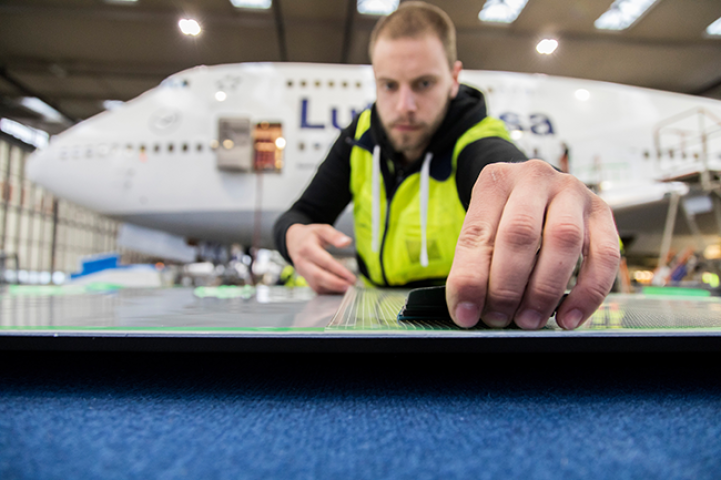AeroSHARK, a "shark skin" to cover aircraft

An artificial film that mimics shark skin: using nature as a model
For years, the aviation industry has been intensively searching for ways to reduce aerodynamic drag. Much of this research has focused on the surface structure of shark skin, which is made up of denticles: tiny V-shaped scales that researchers have found reduce drag and turbulence, allowing sharks to glide through the water smoothly and effortlessly.
Researchers at Lufthansa Technik and the BASF chemical group found the solution, creating AeroSHARK, a film structured with millions of ribs of about 50 microns, called riblets, that mimic the properties of shark skin.
The film, which has already been tested and is currently used on the entire Lufthansa Cargo fleet, has won over SWISS, which is the first airline in the world to use it on a fleet of long-haul Boeing aircraft.
Biomimicry and new technologies to reduce the environmental footprint
Applying 950 m² of this sharkskin film to the surface of the fuselage and engine nacelles will immediately reduce air resistance and, as a result, fuel consumption by about 1.0%. For the entire SWISS Boeing 777 fleet, this will translate into annual savings of more than 48,000 tonnes of Kerosene and a reduction of up to 15,200 tonnes of CO₂ emissions, the equivalent of about 87 long-haul flights from Zurich to Mumbai.
According to the AeroSHARK team, the film is easy to apply, and extremely resistant to UV light, water, oil and the significant temperature and pressure changes that occur outside long-haul aircraft. It can also be applied to the wings, which can help generate additional lift.
A technological, economic and ecological innovation for the aviation industry
SWISS will install AeroSHARK on its fleet of Boeing 777-300ERs in succession from mid-2022 onwards, at appropriate maintenance stops. The covering could also be extended to the wings in the near future, to realise additional savings potential.
Lufthansa Technik and BASF, meanwhile, intend to systematically expand this new technology to other aircraft types and even larger surfaces, in order to be able to offer airlines worldwide even greater support in achieving their emissions targets. According to initial model calculations, the sharkskin technology, in its maximum expansion phase, could even reduce CO2 emissions by up to three percent.
More information:
https://blog.swiss.com
https://www.basf.com
https://www.lufthansa-technik.com/aeroshark





